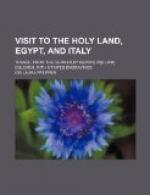On my way homewards I met several fellahs carrying large baskets full of dates, and stopped one of them, in order to purchase some of this celebrated fruit. Unfortunately for me, the dates were still unripe, hard, of a brick-red colour, and so unpalatable that I could not eat one of them. A week or ten days afterwards I was able to procure some ripe ones; they were of a brown colour like the dried fruit, the tender skin could easily be peeled off, and I liked them better than dried dates, because they were more pulpy and not so sweet. A much more precious fruit, the finest production of Egypt and Syria, almost superior to the pine-apple in taste, is the banana, which is so delicate that it almost melts in the mouth. This fruit cannot be dried, and is therefore never exported. Sugar melons and peaches are to be had in abundance, but their flavour is not very good. I also preferred the Alexandrian grape to that of Cairo.
The bazaars, through which we rode in all directions, displayed nothing very remarkable in manufactures or in productions of nature and art.
From first to last I spent a week at Cairo, and occupied the whole of my time from morning till night in viewing the curiosities of the town.
I only saw two mosques, that of Sultan Hassan and of Sultan Amru. Before I was permitted to enter the first of these edifices, they compelled me to take off my shoes, and walk in my stockings over a courtyard paved with great stones. The stones had become so heated by the solar rays, that I was obliged to run fast, to avoid scorching the soles of my feet. I cannot give an opinion touching the architectural beauty of this building, which is built in such a simple style that none but a connoisseur would discover its merits. I was better pleased with the mosque of Sultan Amru, which contains several halls, and is supported on numerous columns. The mosques in Cairo struck me as having a more ancient and venerable appearance than those of Constantinople, while the latter, on the other hand, were larger and more elegant.
I also visited the island of Rodda, which is worthy the name of a beautiful garden. It lies opposite to old Cairo, on the Nile, and is said to be a favourite walk of the townspeople, though I was there twice without meeting any one. The garden is spacious, and contains all kinds of tropical productions: here I saw the sugar-cane, which greatly resembles the stem of the Indian maize; the cotton-tree, growing to a height of five or six feet; the banana-tree, the short-stemmed date-palm, the coffee-tree, and many others. Flowers were also there in quantities which must be cultivated with great care in the hot-houses of my native country. The whole of this collection of plants is very tastefully arranged, and shines forth in the height of luxuriant beauty. It is customary to lay the entire island under water every evening by means of artificial canals. This system is universally carried out throughout the Egyptian plantations, and is, in fact, the only method by which vegetation can be preserved in its freshest green in spite of the burning heat. The care of this fairy grove is entrusted to a German ornamental gardener; unfortunately I was informed of this fact too late, otherwise I should have visited my countryman and requested an explanation of many things which appeared strange to me.




